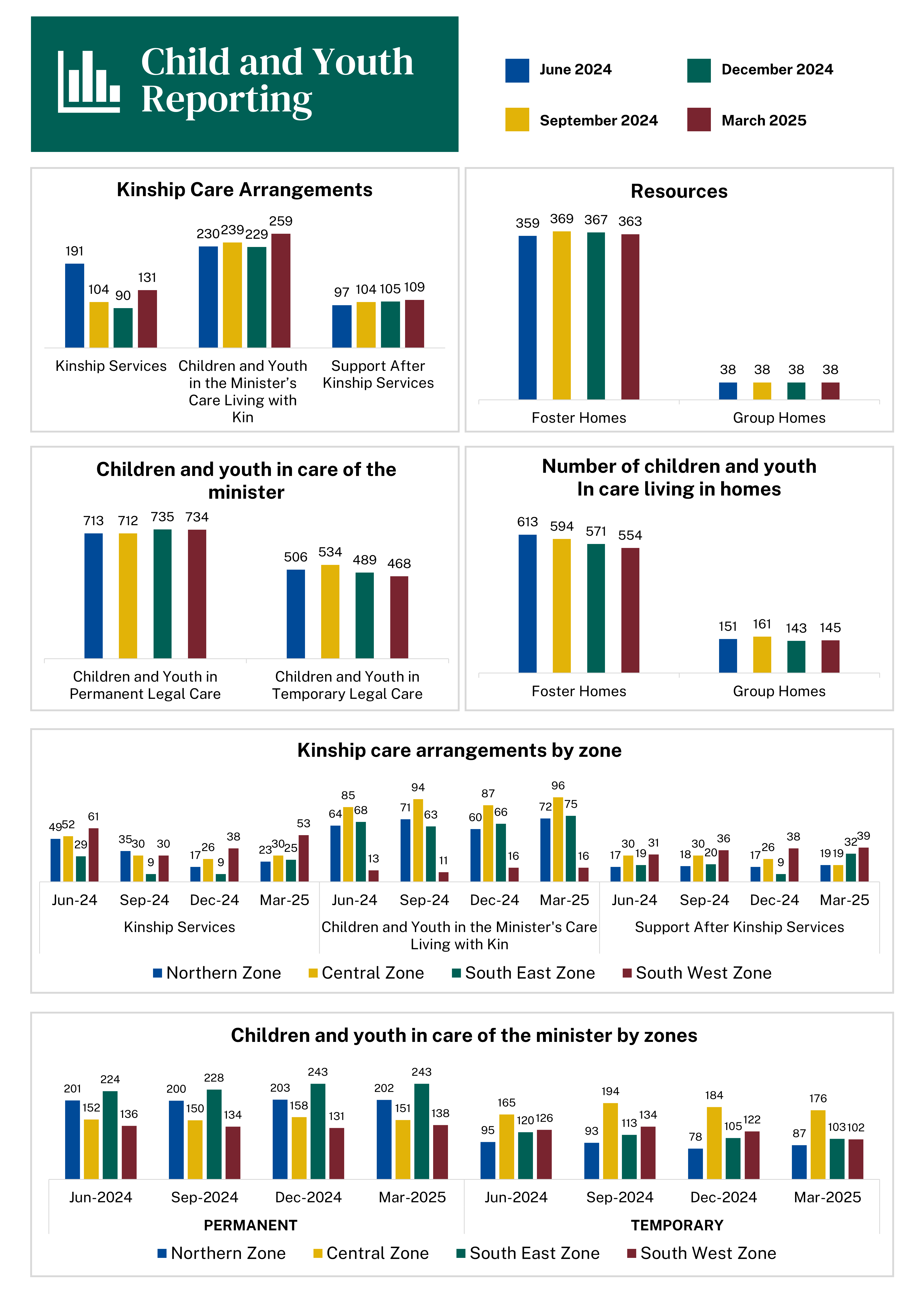Do you have a close relationship with a child or youth who is unable to live with their parents? Would you like to care for them?
If so, kinship care may be for you. It offers children and youth a safe and loving home through someone they already know and trust.
What is kinship Care?
Kinship care is when a family member, relative or someone with a close relationship to a child/youth cares for them (temporarily or permanently) when their parent(s) cannot.
Caring for children and youth through a kinship arrangement can be deeply rewarding. It offers children and youth a chance to grow and thrive in a familiar environment, surrounded by love and support from their family or close community.
Children and youth need kinship care for many different reasons. Often, it is because their parents are not able to keep them safe. They may be any age, from babies up to 26 years old, depending on their needs and situation.
Who can provide kinship care?
A family member, relative or anyone with a close relationship to a child or youth can provide kinship care.
Your role
By sharing your home, you will provide love, care, and support to a child or youth who you already have a close relationship with. You will help them with everyday activities, like homework and chores, and provide encouragement as they grow and learn. Your home will be a place where they feel safe, valued, and part of a family. You will also work with others, like social workers, parents, and teachers, to make sure the child or youth has everything they need to thrive.
Kinship care can be both fulfilling and challenging. By opening your heart and home, you can make a big difference in the lives of children and youth and help them reach their full potential.
Children and youth need kinship caregivers who:
- Understand their unique needs and worries about living with another family.
- Provide stability and consistency in their lives.
- Create a safe, nurturing, supportive, and loving environment.
- Help them stay connected to their family and support the potential return to their family home (if it is in their best interest).
- Help them get involved in the community and explore things they like such as art, sports, music, etc.
- Support and respect their routine, culture, traditions, language, religion, and identity.
- Advocate for them and support their best interests, views, and preferences.
- Help them develop skills for the greatest opportunities as adults.
- Will work as valued member of a support team.
Other ways you can help children and youth
- Kinship is when a family member, relative or someone with a close relationship to a child/youth cares for them (temporarily or permanently) when their parent(s) cannot.
- A foster home is when an individual or family provides full-time care for a - child/youth. Fostering focuses on providing a safe, temporary home while working toward the best long-term solution for the child or youth. Visit the Fostering a Child or Youth page for more information and to apply.
- Respite or relief care is when an individual or family provides short-term care for a foster child/youth such as on weekends or holidays. Visit the Supporting Caregivers, Children and Youth Through Respite/Relief Care page for more information and to apply.
- Adoption is when an individual or family permanently and legally adopts a child/youth. There are multiple types of adoption, each with their own application process. Visit the Adopting a Child or Youth page for more information and to apply.

Anyone with a close relationship to a child or youth may be eligible to provide kinship care. You don’t have to be married, wealthy, or have a specific educational background to provide kinship care.
Our top priority is to find children and youth a home where they feel safe, loved, and connected to someone they already know and trust.
You may be eligible to provide kinship care to a child or youth if you:
- Are 19 years of age or older,
- Are a Canadian citizen or permanent resident, and
- Have a living space that provides a secure and healthy environment for children/ youth.
If you are considering kinship care:
Call Social Development at 1-833-733-7835.
- Select your preferred language (press option 1 for English, or 2 for French).
- Next, press option 1 to speak with a child protection social worker.
Provide Social Development with the following information:
- You have a close relationship with a child/youth who can't live with their parent(s) right now,
- You want to care for the child/youth, and
- You want the child/youth's social worker to get in touch with you about kinship care.
Provide your contact information and name of the child/youth you wish to care for.
The Social Worker will be provided with the details of your request along with your contact information to:
- Reach out to the child, youth, and/or their parents, and
- If appropriate, contact you about a possible kinship arrangement.

To complete your application, you must be willing to:
Authorize a Social Development record check,
- Social Development record checks allow the department to check their records to see if you were involved or mentioned in any reported, investigated, or confirmed cases of abuse/neglect involving a child, youth, senior, or person with a disability.
- It is important to note that a history of past child and youth protection services involvement among family members does not automatically disqualify you from caring for a child or youth. We consider each case individually.
Participate in a family assessment,
Provide all the supporting documents required by Social Development at any time in the process, and
Provide a Criminal and Vulnerable Sector Record Check (for all adults 19 years of age or older living in the household, and any immediate family members with a criminal history).
- It is important to note that a history of criminal involvement among family members does not automatically disqualify you from caring for a child or youth. We consider each case individually.
- A Criminal and Vulnerable Sector Record Check is a special kind of background check done by the police. This check is done to make sure that people who want certain jobs or responsibilities are safe and trustworthy.
- Criminality Checks will look at your criminal history to see if you have done something against the law in the past.
- Vulnerability Checks help identify people who may pose a risk to the safety of vulnerable groups (ex: children or youth, seniors, people living with a disability, etc.).